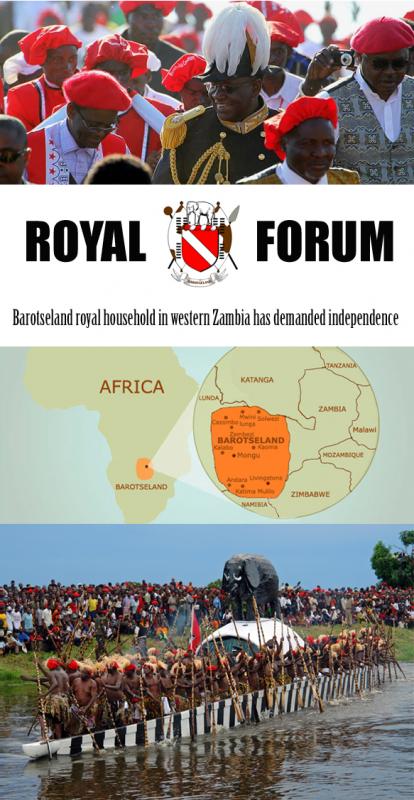به زبان فارسی
PICTORY
LATEST MUSIC
SEARCH
ELEPHANT KINGDOM: Barotseland's royals demand independence from Republic of Zambia
by Darius Kadivar
12-Apr-2012
The Barotseland royal household in western Zambia has demanded independence, accusing the government of ignoring a 1964 treaty. Barotseland, was a protectorate under British colonial rule and became part of Zambia at the country's independence in 1964. (See Related News)
(Source: persianrealm.com)
**************************************
**************************************
THE ELEPHANT KINGDOM
**************************************
**************************************
Zambia's fabulous Kuomboka ceremony:
Africa - Victoria Falls – Barotseland:
*************************************************************
*************************************************************
ZAMBIAN REPUBLIC VS BAROTSELAND KINGDOM’s INDEPENDENCE
************************************************************
************************************************************
Zambian Argues against barotseland independence:
Zambia Independence and Economy with Isaac Ngoma (24 oct. 2011):
47th Independence Day of Zambia, of what was then Northern Rhodesia from Britain in 1964. Joining ABN's Lerato Mbele on the line to give us the latest news on Zambian Independence and the economy is Isaac Ngoma, President of The Economics Association of Zambia.(Note to Watch Double Click Here)
*************************************************************
*************************************************************
CONVERSATIONS WITH HISTORY WITH ZAMBIA’s FIRST PRESIDENT
*************************************************************
*************************************************************
Conversations host Harry Kreisler welcomes His Excellency Kenneth D. Kaunda, the First President of Zambia (1964-1991). President Kaunda discusses the national and international challenges he confronted as a national leader. He also reflects on his current work with NGOs in the global fight to fight disease, poverty and inequality. Series: "Conversations with History" [1/2007] [Public Affairs] [Show ID: 12102]********************************************
********************************************
BAROTSELAND KINDOM DEMANDS INDEPENDENCE
********************************************
********************************************
Barotseland kingdom seeks to leave Zambia (bbc)
The Barotseland royal household in western Zambia has demanded independence, accusing the government of ignoring a 1964 treaty.Barotse Ngambela, or Prime Minister, Clement Sinyinda told the BBC that successive Zambian governments had failed to honour the deal for the kingdom to enjoy autonomy.
Mr Sinyinda said the independence movement would remain peaceful.
The government has denounced the call as treason.
Barotseland, the kingdom of the Lozi people, was a protectorate under British colonial rule and became part of Zambia at the country's independence in 1964.
The area is now known as Western Province, although the BBC's Mutuna Chanda in the Zambian capital, Lusaka, says before national independence, it also extended into other areas.
Our reporter says this is the first time the Barotse royal household has backed the calls for the region to become independent, which have long been made by activists who accuse the government of ignoring the region, which remains one of the poorest in the country.
After two days of meetings, a group of traditional Lozi leaders, calling itself the Barotseland National Council, issued a declaration
"We the people of Barotseland declare that Barotseland is now free to pursue its own self-determination and destiny. We are committed to a peaceful disengagement with the Zambian government," it said, according to the AFP news agency.
"We don't want to use violence - we want to use peaceful means to achieve what we want to achieve," Mr Sinyinda told the BBC's Network Africa programme.
He said that while campaigning for last year's election, President Michael Sata had promised that the the 1964 treaty would be honoured but he had now gone back on his word.
Zambian Vice-President Guy Scott told parliament the resolution was "irresponsible and unacceptable".
Our reporter says that the Lozis are the most numerous people in Western Province but that the leaders of some other ethnic groups who live in the region, such as the Nkoya and Mbunda, are opposed to independence.
Last year, two people were shot dead in the main town in Barotseland, Mongu, when police broke up a meeting of activists calling for secession.
Related :
Zambia Profile Full name: Republic of ZambiaPopulation: 13.2 million (UN, 2010)
Capital: Lusaka
Area: 752,614 sq km (290,586 sq miles)
Major language: English (official), Bemba, Lozi, Nyanja, Tonga
Major religions: Christianity, indigenous beliefs, Hinduism, Islam
Life expectancy: 49 years (men), 50 years (women) (UN)
Monetary unit: 1 Kwacha = 100 ngwee
Main exports: Copper, minerals, tobacco
GNI per capita: US $1,070 (World Bank, 2010)
Internet domain: .zm
International dialling code: +260
Related Blogs on African Monarchies :
Libya independence: King Idris anniversary celebrated ROYAL HOPEFUL:Libyan Crown Prince offers to help homeland MONARCHY OR REPUBLIC ? British MP Calls For Referendum On Libya’s Future
Former Kingdom’s PM Adovocates A Parliamentary System for Future Libya
| Recently by Darius Kadivar | Comments | Date |
|---|---|---|
| TOMBSTONE: Bidding Goodbye to Iranian.com (ers) | 4 | Dec 05, 2012 |
| ROYAL PREGNANCY: Prince William, Duchess of Cambridge Announce Pregnancy | 3 | Dec 04, 2012 |
| DESPERATE HOUSEWIVES: Golshifteh Farahani & Sienna Miller in Road Movie ‘Just Like a Woman » | - | Dec 03, 2012 |
RECENT COMMENTS
IRANIANS OF THE DAY
| Person | About | Day |
|---|---|---|
| نسرین ستوده: زندانی روز | Dec 04 | |
| Saeed Malekpour: Prisoner of the day | Lawyer says death sentence suspended | Dec 03 |
| Majid Tavakoli: Prisoner of the day | Iterview with mother | Dec 02 |
| احسان نراقی: جامعه شناس و نویسنده ۱۳۰۵-۱۳۹۱ | Dec 02 | |
| Nasrin Sotoudeh: Prisoner of the day | 46 days on hunger strike | Dec 01 |
| Nasrin Sotoudeh: Graffiti | In Barcelona | Nov 30 |
| گوهر عشقی: مادر ستار بهشتی | Nov 30 | |
| Abdollah Momeni: Prisoner of the day | Activist denied leave and family visits for 1.5 years | Nov 30 |
| محمد کلالی: یکی از حمله کنندگان به سفارت ایران در برلین | Nov 29 | |
| Habibollah Golparipour: Prisoner of the day | Kurdish Activist on Death Row | Nov 28 |



